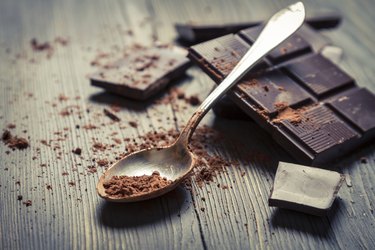
The use of chocolate originated in South America around A.D. 250 to 900 with a bitter chocolate drink made from cacao beans. The creamy, sweet milk chocolate of today bears little resemblance to the chocolate that the Mayans created so many years ago. Dark chocolate, however, offers a pleasantly bitter reminder of what chocolate originally may have been.
Types of Chocolate
Video of the Day
Chocolate is derived from cacao, which refers to the components derived from the cocoa bean. The three cocoa components are chocolate liquor, cocoa butter and cocoa powder. In general, the higher the cacao content, the more bitter or "dark" the chocolate will be. Chocolate ranges from white chocolate, which contains no cacao, to milk chocolate, bittersweet chocolate and unsweetened chocolate, which contain increasing amounts of cacao. This rise in cacao percentage gives them their increasingly strong, rich flavor.
Video of the Day
Health Benefits of Dark Chocolate
If you're looking for some sweet tooth justification, look no further than dark chocolate, which is packed with antioxidants known as flavanols. These antioxidants help the body's cells resist damage. Specifically, flavanols are believed to improve vascular health by lowering blood pressure and improving blood flow to the brain and heart. Flavanols can also help blood platelets be less sticky so that they don't form clots as easily. The higher the cacao content, the more flavanols the chocolate will contain. When choosing a dark chocolate, look for a high cacao content with the least amount of sugar or other ingredients that add calories.
Caffeine Content
Dark chocolate contains more cocoa solids than other types of chocolate, so it has a higher caffeine content than milk or white chocolate. Caffeine content increases as cacao content increases and varies greatly depending on the manufacturer of the chocolate. Many kinds of dark chocolate (60 percent cacao) contain around 20 milligrams of caffeine per 1.5-ounce serving. But as the percentage of cacao goes up, the caffeine content can rise. For instance, a 1.5-ounce serving of 80 percent cacao dark chocolate can contain 40-plus milligrams of caffeine, with some more expensive brands having up to 75 milligrams. By comparison, coffee can contain between 100 and 200 milligrams of caffeine per 8 ounces, depending on how strongly it is brewed.
Safe Stimulation
Because caffeine is a stimulant, some populations -- including children, individuals with heart conditions and high blood pressure, and pregnant women -- may be instructed to limit or eliminate their intake. Consuming 250 milligrams or less per day has been deemed safe for many healthy people. Unless you're very sensitive to caffeine, an occasional serving of antioxidant-rich dark chocolate is probably fine. Check with your health care provider before consuming dark chocolate if you have concerns about caffeine.
- Cleveland Clinic: Heart-Health Benefits of Chocolate Unveiled
- Medline Plus: Caffeine in the Diet
- Field Museum: Introduction: Chocolate’s History at a Glance
- Energy Fiend: Dark Chocolate Caffeine Levels
- Bowling Green State University: Caffeine Content of Food and Drugs
- HealthCastle.com: Caffeine Content of Common Foods and Drinks
- The Hershey Co.: Caffeine and Theobromine